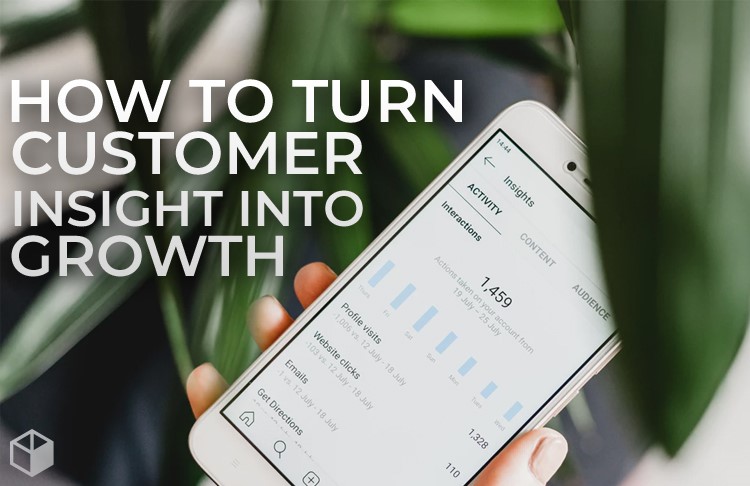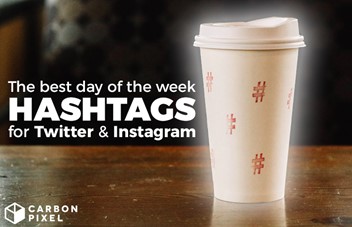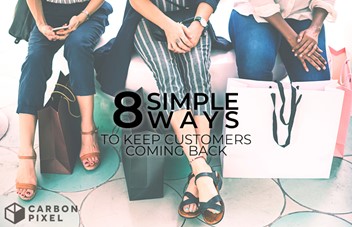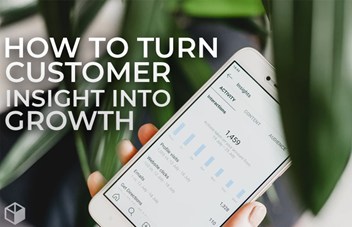Knowing who exactly is buying your product(s), the demographic they fit in and also their buying habits is pretty important but, significantly important is also knowing why they buy your product(s). Because, after all the product is tailored to fit the needs of the customer, rather than fit the needs of your business.
When you gather customer insight properly and of course analyse it correctly, you’ll not only discover what your customers love and hate about your products but also why the customer is purchasing that product. You’ll then know how to tailor future products for them. Carefully gathering customer insights that you can learn from and customise your service for the customer, from the customer journey to advertising campaigns and even the product will ultimately, make them more likely to return in future, growing their lifetime value to your business.
Marketing is increasingly becoming about effective implementation of personalisation. In today's social media age algorithms define what we see and don’t see, a broad and impersonal campaign has little to no effect on the customer. Customers are starting to expect a brand to know them. They expect you to tailor content for them, not just for their demographic. After all, everyone is different.
An example of a brand who does this exceptionally well is Spotify, here's why.
Spotify: A leader in Customer Insight
Spotify pride themselves on knowing their consumer base and offering a seamless personalised experience, and it’s no coincidence that they are the largest music streaming service with over 217 million users, of which 100 pay for a subscription, according to the 2019 Q1 Results from Spotify
How do they gather it?
Spotify conducted a survey to "Understand People Through Music" where they surveyed over 7,000 millennials across the UK, US and Australia and even conducted interviews with 600 of those. Participants were asked a series of questions to help Spotify and Investors better understand the locations, devices and emotions they feel in their daily lives whilst they stream music from the Spotify Platform. They then used this data to further analyze behavioural diaries alongside their streaming intelligence AI to get a richer contextual understanding into the behaviours of their users. This was all conducted in a bid to gain better customer insights to promote brands investing in Spotify.
But, Spotify does not stop there. Whilst it does a lot to gather customer insight, from tracking everything you listen to, skip, save and search for to determine your music tastes. If you're a free user they will use this data to serve you ads that you are more likely to convert on and ads that will interest you. The more data Spotify collects on you, the more data they have available to be able to deliver you a more personalised experience, making Spotify seem bespoke to you.
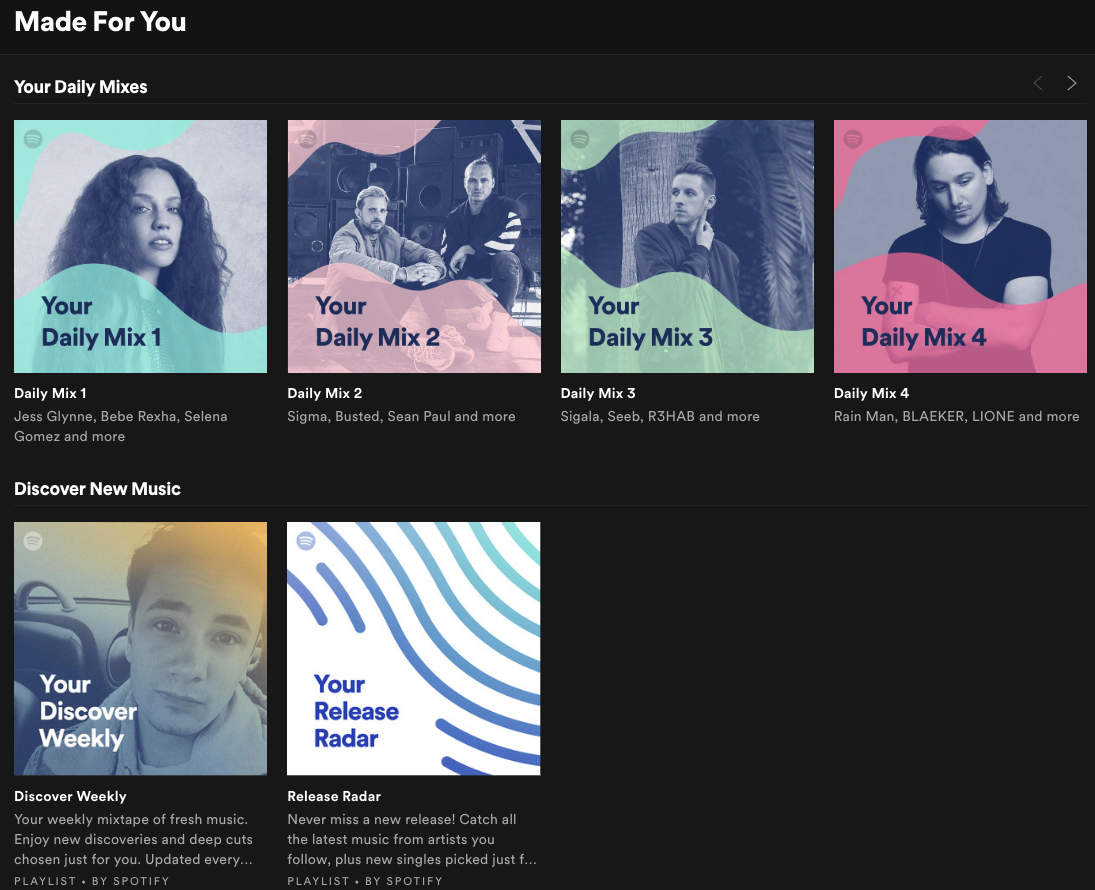 Spotify even goes as far to offer their "Affinity Survey" where users can "Help tune Spotify to your tastes by telling us how much you like 10 songs you've listened to."
Spotify even goes as far to offer their "Affinity Survey" where users can "Help tune Spotify to your tastes by telling us how much you like 10 songs you've listened to."
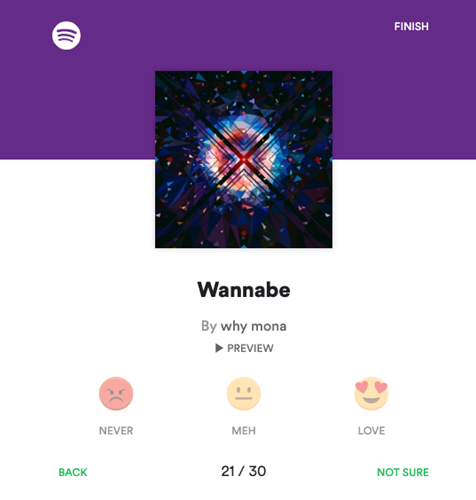
The efforts Spotify goes to shows, they offer a truly personalised experience, a whole tab on the app is dedicated to the user, known as “Made For You”. In here, you are given up to 6 new playlists every day, known as "Daily Mixes" these will serve you songs you love and may not have listened to in a while as well as a few new songs mixed in. You also have your Release Radar, and your Discover Weekly playlist, which are weekly AI-Curated playlists that suggests songs Spotify thinks you'll love, based on the music you already listen to.
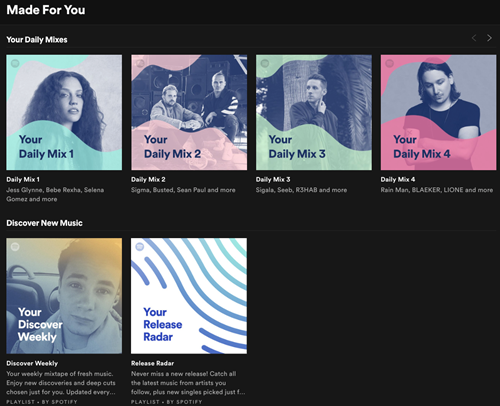
No other streaming service offers this level of personalisation, sure Apple Music is a strong contender and offers this kind of playlist personalisation, but Spotify, in my opinion anyway, feels more premium. You don't have to go through a setup process with Spotify as you do on Apple Music to select artists and genres you love. Spotify treats you as a blank canvas and learns from you as your tastes evolve over time. Whereas Apple Music treats you like most companies do, and only adapt to your changes down the line. Not to mention that Spotify does not let artists interfere with your tastes. Apple Music will suggest songs it WANTS you to listen to (because artists have paid for that) whereas Spotify recommends songs you want to listen to.
Everything Spotify does is achieved through Customer Insight and some very clever marketing people and developers. By looking through the "Understanding People Through Music" survey results, we can easily tell that Spotify fully understands it's user base. They know that their younger users tend to "soundtrack their life" through music that relates to emotions they are currently feeling, memories and relationships. This means they know this particular audience require different types of music across various genres to match their mood or to match what they currently may be doing with their lives.
Spotify also highlighted the different moments in a typical users day. Savvy marketers can use this data to grab the attention of users at the best possible time to yield better results or even tailor their ads to match the moods of users. Spotify shows us that they understand that personalisation is important and they encourage marketers to also adopt the same way of thinking as they do. After all, it's clearly working, Spotify (at the time of writing this) are still the global dominator for music streaming.
Think of it this way, you wouldn't run an ad for Ice-Cream in December, so why waste time creating ads, promoting them via Spotify and not using the insights Spotify offer to further personalise and tailor your campaigns. For example, if someone is listening to the "Workout Music" playlist, you would want the ad to be upbeat and inspirational, not dull and a voice telling someone to go and buy this now. It just doesn't make much sense really does it?
Ultimately, whilst this seems great for advertisers and consumers. All it does it increase Spotify's user base, thus more paid and free subscribers meaning more money in the bank. Increasing growth!
Synopsis
For those who skimmed this post, or didn't retain any information, let's go over what Spotify does to gather Customer Insight;
- Tracks what you listen to, skip, pause, play, share and search for
- Encourages users to complete surveys designed to enhance their music experience
- Conducts regular surveys into their customer's habits
They then use this data to;
- Offer a personalised platform, complete with daily and weekly AI-Curated playlists based on what you like
- Tailor ads to you and your music tastes
- Suggest music based on your moods and activities
This benefits Spotify because;
- Customers become brand advocates, tweeting and sharing new music they discover/playlists created for them
- New & Upcoming Artists get discovered
- Advertisers can fully target ads, meaning more ad revenue for Spotify
- More users subscribe to the service, thus GROWTH
All in all, Customer Insight is pretty important, it allows you to create a one-of-a-kind personalised customer experience that can be pulled across to your marketing strategy and even your product(s)/services.
If you don't understand how this related to your business, or need help on getting started with Customer Insights, get in touch with us and we'll be happy to help you bring your brand into the modern age and turn your current customers into brand advocates.


